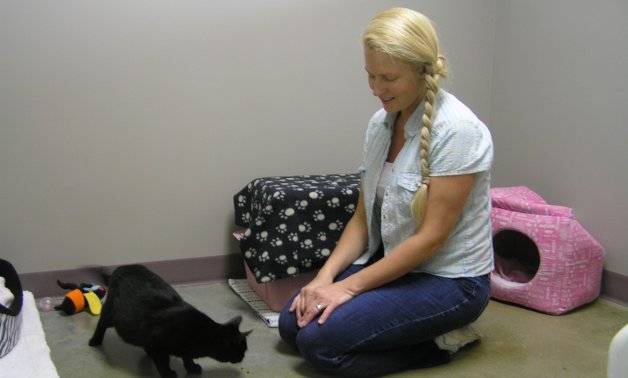Pet care for busy professionals
Business travel poses challenges to pet owners, but there are solutions available

Always make sure the person caring for your pet is willing to spend time interacting with them. — Photo courtesy PAWS
Many professionals are required to travel in order to network and conduct their businesses. Those with pets may find this daunting, as they don’t want to leave their furry companions behind. However, there are a number of options that enable pet owners to give their animals the best possible care while still maintaining their business obligations.
Lynn Ray works with the Creston Pet Adoption and Welfare Society (PAWS), and she took the time to offer us some valuable tips for pet owners who travel.
Choosing a kennel
In some cases, bringing the pet with you on a trip is not an option, so a high-quality kennel may be the best choice. Ray suggests that you contact a local rescue group, other pet owners or trainers in order to find reputable kennels in your area.
“Once you have that information, it is always wise to visit the kennel and see the facility, how (the animals) are treated,” said Ray. “Find out how many hours per day (the pets) spend in their kennel and if there is interaction.”
She also emphasized the importance of having your animals’ vaccinations for kennel cough and other diseases up to date, and checking to find out what the kennel’s policy is on vaccinations.
Last of all, make sure your pet has something to remind them of home.
“When an animal goes to a kennel, it is always a good thing to send along a familiar blanket or toy to help with the stress,” said Ray. “Be aware the toy may not always come back home, particularly if it gets out into a common area. In our case the kennel we use knows and understands our dog's illness and is willing to administer his medication properly. They even go the extra mile by always housing him in the same kennel so that he feels more comfortable in his space.”
Bringing your pet along
There are numerous hotels that will allow pets, so bringing your furry family member with you might be a possibility. However, doing so entails necessary preparations to make sure the pet is comfortable and your trip goes smoothly.
“People should always check with the particular hotel they are staying at with regard to their policies,” said Ray. “BCAA used to publish a North American guide to hotels that were pet friendly. If the owner is having to go to work, they will need to have someone to stay with the animal while they are there, unless the animal can go to work with them. There are very few hotels that will permit you to leave an animal unattended in a room.”
The method of transportation also requires consideration. If you're bringing an animal on an airplane, check the airline’s policies and added costs of taking them on board. They may have requirements as to the size of the travel kennel you use, and other regulations you will want to know about ahead of time. Ray suggests that you bring a favourite blanket or toy along to comfort the animal during flights.
If you are driving, plan for extra travel time. Your pet may need to take frequent bathroom breaks, or they might need to stop for a drink or a bite to eat along the way.
“Of course there is always the gear,” said Ray, “such as feeding stations/bowls, food, bed, leashes, etc. that are needed. On day trips with our dog I always take along sufficient water for him so that he isn't drinking several different kinds of water that may upset his system.”
Hiring a pet sitter
The pet-sitting business is becoming increasingly popular, and hiring someone to care for your animals is a great way to support them while you are away. Pet sitters may either bring your animals into their home or come to your residence and look after your pets in the comfort of a familiar environment. While this may be the most cost-effective and least stressful option for all involved, you still have to be rigorous in choosing the right person for the job.
“In addition to checking these people out with regard to their treatment of animals, people will need to have due diligence with regard to checking them out for trustworthiness, since they will be in your home with your possessions and treasures,” said Ray.
Regardless of which option you choose, it is always advisable to have updated identification on your animals in case they do get lost during travel or while being cared for in your absence. Make sure your pet's collar or tag is legible and current, and if possible have a microchip placed.
"It is always a good idea to carry a photo of the pet with you," said Ray. "Preferably with you and the pet in the photo. It makes identifying and claiming a lost pet much easier. Lastly, in addition to taking all the necessary medications that your pet may be taking, a pet first aid kit is always a good thing to take with you."





